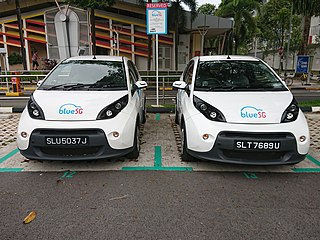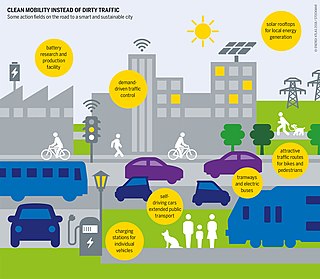
Utility cycling encompasses any cycling done simply as a means of transport rather than as a sport or leisure activity. It is the original and most common type of cycling in the world. Cycling mobility is one of the various types of private transport and a major part of individual mobility.

World Car Free Day, which is celebrated on September 22, encourages motorists to give up their cars for a day. Organized events are held in some cities and countries.

Carsharing or car sharing or car clubs (UK) is a model of car rental where people rent cars for short periods of time, often by the hour. It differs from traditional car rental in that the owners of the cars are often private individuals themselves, and the carsharing facilitator is generally distinct from the car owner. Carsharing is part of a larger trend of shared mobility.

Sustainable transport refers to ways of transportation that are sustainable in terms of their social and environmental impacts. Components for evaluating sustainability include the particular vehicles used for road, water or air transport; the source of energy; and the infrastructure used to accommodate the transport. Transport operations and logistics as well as transit-oriented development are also involved in evaluation. Transportation sustainability is largely being measured by transportation system effectiveness and efficiency as well as the environmental and climate impacts of the system. Transport systems have significant impacts on the environment, accounting for between 20% and 25% of world energy consumption and carbon dioxide emissions. The majority of the emissions, almost 97%, came from direct burning of fossil fuels. In 2019, about 95% of the fuel came from fossil sources. The main source of greenhouse gas emissions in the European Union is transportation. In 2019, it contributes to about 31% of global emissions and 24% of emissions in the EU. In addition, up to the COVID-19 pandemic, emissions have only increased in this one sector. Greenhouse gas emissions from transport are increasing at a faster rate than any other energy using sector. Road transport is also a major contributor to local air pollution and smog.

Eisenacher Motorenwerk (EMW) was an East German manufacturer of automobiles and motorcycles based in Eisenach. EMW also entered Formula One as a constructor in 1953, but participated in only one race, the 1953 German Grand Prix. The car retired after 12 laps with exhaust problems.

Bicycle commuting is the use of a bicycle to travel from home to a place of work or study — in contrast to the use of a bicycle for sport, recreation or touring.
In town, without my car! (ITWMC) is an EU campaign and day every autumn since 1998 for an increased use of other vehicles than the car. It has since spread beyond the EU, and in 2007 over 2,000 towns and cities in 35 countries participated. In 2008 it was active in 2,102 municipalities in 39 countries

Transportation demand management, traffic demand management or travel demand management (TDM) is the application of strategies and policies to reduce travel demand, or to redistribute this demand in space or in time.
The Automobilwerk Eisenach (AWE) was an automobile manufacturer in Eisenach, Germany.
Francis Eric Knight Britton was an American political scientist and sustainability activist who has lived and worked in Paris, France, since 1969. As the main convenor of The Commons: Open Society Sustainability Initiative and its various networks, he is well known for promoting integrated public transport, carsharing and bike sharing.

The sustainable city, eco-city, or green city is a city designed with consideration for social, economic, environmental impact, and resilient habitat for existing populations, without compromising the ability of future generations to experience the same. The UN Sustainable Development Goal 11 defines sustainable cities as those that are dedicated to achieving green sustainability, social sustainability and economic sustainability. They are committed to doing so by enabling opportunities for all through a design focused on inclusivity as well as maintaining a sustainable economic growth. The focus also includes minimizing required inputs of energy, water, and food, and drastically reducing waste, output of heat, air pollution – CO2, methane, and water pollution. Richard Register first coined the term ecocity in his 1987 book Ecocity Berkeley: Building Cities for a Healthy Future, where he offers innovative city planning solutions that would work anywhere. Other leading figures who envisioned sustainable cities are architect Paul F Downton, who later founded the company Ecopolis Pty Ltd, as well as authors Timothy Beatley and Steffen Lehmann, who have written extensively on the subject. The field of industrial ecology is sometimes used in planning these cities.

An electric vehicle charging network is an infrastructure system of charging stations to recharge electric vehicles. Many government, car manufacturers, and charging infrastructure providers sought to create networks. As of November 2020 the largest fast-charging location was in California on the Tesla Supercharger network, with 56 charging stalls. Today, charging network vendors include either proprietary solutions, or hardware agnostic solutions. Hardware-agnostic vendors allow for customers to switch out their charge stations and/or switch to a different network vendors ; whereas proprietary vendors do not allow for customers to switch.
The EcoMobility Alliance is a global, cross-sectoral partnership for the affirmation of EcoMobility i.e. the integrated promotion of walking, cycling, wheeling and passenging. The Alliance promotes EcoMobility for the purpose of mobility and accessibility for all, health, clean air, noise avoidance, energy efficiency, greenhouse gas emission reduction and individual cost savings, and thus as an opportunity for sustainable urban development.

Active mobility, soft mobility, active travel, active transport or active transportation is the transport of people or goods, through non-motorized means, based around human physical activity. The best-known forms of active mobility are walking and cycling, though other modes include running, rowing, skateboarding, kick scooters and roller skates. Due to its prevalence, cycling is sometimes considered separately from the other forms of active mobility.
Ecovolis is a community based bike sharing program in Tirana, Albania, launched on March 22, 2011, from an environmental NGO called Social Stimulating Alternatives Program (PASS). The system is based on 6 bike stations, respectively staffed by two employees in two shifts. Ecovolis program has proven successful in significantly increasing bicycle use in Tirana.
UQM Technologies Inc was an American manufacturer of electrical motors, generators, motor controllers, fuel cell compressor systems and hybrid systems for passenger and commercial vehicles. Established in 1967 as Unique Mobility Inc, UQM was based in Longmont, Colorado. UQM's products were sold direct to original equipment manufacturers (OEM).
Mobility as a service (MaaS) is a type of service that, through a joint digital channel enables users to plan, book, and pay for multiple types of mobility services. The concept describes a shift away from personally-owned modes of transportation and towards mobility provided as a service. This is enabled by combining transportation services from public and private transportation providers through a unified gateway that creates and manages the trip, which users can pay for with a single account. Users can pay per trip or a monthly fee for a limited distance. The key concept behind MaaS is to offer travelers mobility solutions based on their travel needs. Specialist urban mobility applications are also expanding their offerings to enable MaaS, such as Transit, Uber and Lyft.
A Sustainable Urban Mobility Plan (SUMP) is a planning concept applied by local and regional authorities for strategic mobility planning. It encourages a shift towards more sustainable transport modes and supports the integration and balanced development of all modes. A SUMP is instrumental in solving urban transport problems and reaching local and higher-level environmental, social, and economic objectives. Sustainable Urban Mobility Plans are defined as "a strategic plan designed to satisfy the mobility needs of people and businesses in cities and their surroundings for a better quality of life. It builds on existing planning practices and takes due consideration of integration, participation, and evaluation principles.”

Mariánské náměstí is a square in Old Town, Prague 1 in Czechia. It is surrounded by significant public buildings such Clementinum with National library, New City Hall with Mayor of the City of Prague residence and Prague City Council, Clam-Gallas Palace and Trauttmansdorff Palace.

Askoll EVA S.p.A. is an Italian manufacturer of two-wheeled electric vehicles for urban mobility. The Dueville based company produces e-bikes, electric scooters, components and kits. Askoll EVA is a subsidiary of Askoll Group, an Italian corporation specialized in manufacturing electric motors and drain pumps for washing machines, heating systems and other domestic appliances.













